-
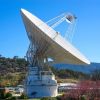 +17 +4
+17 +450 Years Later, This Apollo-Era Antenna Still Talks to Voyager 2
DSS-43 is the only antenna that can communicate with the probe
-
 +25 +5
+25 +5NASA's ice-hunting VIPER moon rover getting ready to slither to the launch pad
"All of VIPER’s flight instruments are installed, and the rover is more than 80% built!"
-
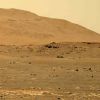 +19 +3
+19 +3NASA is looking for people to test out its Mars simulator for a year
The agency is accepting applicants for the second cohort of its Mars simulator mission. Participants will live and work from a 3D-printed, 1,700-square-foot facility at NASA's Houston space center.
-
 +22 +6
+22 +6Death, Lonely Death
We thought we knew how Voyager would end. The power would gradually, inevitably, run down. The instruments would shut off, one by one. The signal would get fainter. Eventually either the last instrument would fail for lack of power, or the signal would be lost. We didn’t expect that it would go mad.
-
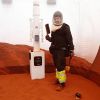 +15 +1
+15 +1NASA is looking for volunteers to live in its Mars simulation for a year
NASA put out an open call on Friday for volunteers to participate in its yearlong Crew Health and Performance Exploration Analog (CHAPEA 2) mission. The space agency will select four people for a crew that will be housed in its 1,700-square-foot 3D-printed habitat in Houston.
-
 +25 +9
+25 +9Flipped Bit Could Mark The End Of Voyager 1‘s Interstellar Mission
Flight controllers have determined that the problem lies within the one remaining FDS on board (the backup FDS failed back in 1981), most likely thanks to a single bit of corrupted memory.
-
 +19 +2
+19 +2NASA to Study Effects of Radio Noise on Lunar Science - NASA
In February 2024, Intuitive Machines’ IM-1 mission will launch to the Moon’s South Polar region, as part of NASA’s Commercial Lunar Payload Services, or CLPS,
-
 +16 +3
+16 +3Why NASA Is Watching Where Idaho’s Parachuting Beavers Landed
The mini-paratroopers have a new role to play today.
-
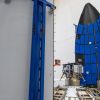 +21 +3
+21 +3First U.S. lunar lander in more than 50 years rockets toward the moon
The first U.S. lunar lander in more than 50 years rocketed toward the moon Monday, launching private companies on a space race to make deliveries for NASA and other customers.
-
 +4 +1
+4 +1How would we know whether there is life on Earth? This bold experiment found out
Thirty years ago, astronomer Carl Sagan convinced NASA to turn a passing space probe’s instruments on Earth to look for life — with results that still reverberate today.
-
 +48 +6
+48 +6Fedoras in Space! Red Hat helps with NASA's Artemis Lunar missions
Lockheed Martin uses Red Hat OpenStack and Red Hat Enterprise Linux to host NASA's Artemis mission simulations.
-
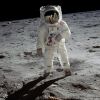 +24 +6
+24 +6Prada to design Nasa's new moon suit
Art meets science as Prada designers help create the spacesuits for the 2025 moon mission.
-
 +38 +10
+38 +10NASA wants more 'space tug' ideas to deorbit the International Space Station in a fiery finale
A spaceship will safely bring down the U.S. segment of the ISS after the program concludes in 2030.
-
 +39 +11
+39 +11Queen's Brian May helped NASA return its first asteroid sample
Brian May has once again proven why he is rock royalty. Not only is he the Queen guitarist, but he is also an astrophysicist who recently helped NASA return its first ever asteroid sample to Earth.
-
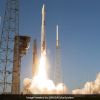 +22 +6
+22 +6NASA's Historic Asteroid Space Probe Set To Return To Earth After 7 Years
NASA's first mission to retrieve an asteroid sample and return it to US is expected to reach a perilous finale on Sunday with a descent into the Utah desert. Scientists hope the material will help understand the formation of solar system.
-
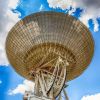 +31 +3
+31 +3NASA officials sound alarm over future of the Deep Space Network
"I'm not sure who thought it was a good idea to put up CubeSats with Artemis I."
-
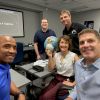 +19 +3
+19 +3For the first time in 51 years, NASA is training astronauts to fly to the Moon
“They’ve got a great adventure ahead of them.”
-
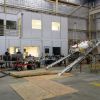 +21 +3
+21 +3NASA's quirky new lunar rover will be the first to cruise the moon's south pole
It’s no simple feat to send a rover to space, land it on a celestial body, and get the wheels rolling. NASA has used all kinds of techniques: The Pathfinder rover landed on Mars in 1997 inside a cluster of airbags, then rolled down its landing vehicle’s “petals,” which bloomed open like a flower, to the dusty surface. Cables attached to a rocket-powered “sky crane” spacecraft dropped the Perseverance Mars rover to the Red Planet’s surface in 2021.
-
 +33 +7
+33 +7Seven Amazing Accomplishments the James Webb Telescope Achieved in Its First Year
The James Webb Space Telescope, the largest and most sophisticated space observatory ever built, has been sending back images and data for almost a full year now—and in that time it has delivered a treasure trove of information about everything from stars and planetary systems in our own galactic neighborhood to distant galaxies that formed when the universe was a tiny fraction of its current age.
-
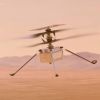 +22 +2
+22 +2NASA makes contact with Mars helicopter after long silence | Digital Trends
NASA has restored contact with its Mars helicopter after 63 days of silence. The communications dropout, however, wasn't unexpected.
Submit a link
Start a discussion




















